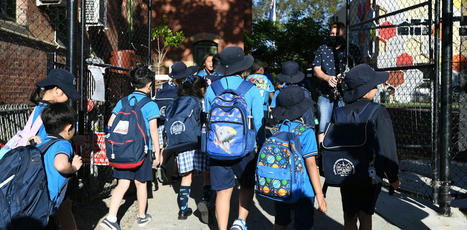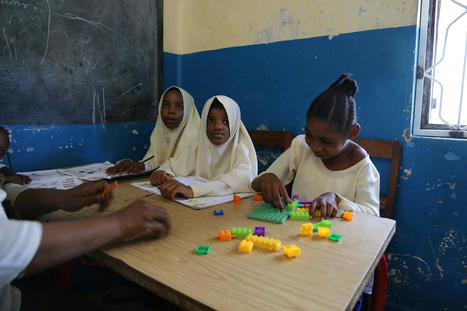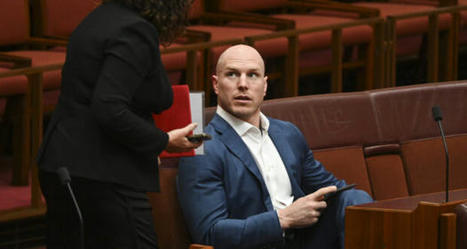 Your new post is loading...
 Your new post is loading...

|
Scooped by
John Gougoulis
April 16, 2024 2:33 AM
|
Brad Olsen and John McIntosh discuss how teacher agency and support can affect school and student outcomes.

|
Scooped by
John Gougoulis
April 12, 2024 12:36 AM
|
If the ban on girls’ education in Afghanistan persists, consequences could include higher rates of abuse, the spread of extremism and billions of dollars in economic loss.

|
Scooped by
John Gougoulis
April 5, 2024 5:33 AM
|
Issues with school leadership is the number one factor pushing teachers out of the profession, an Australian-first study has found.

|
Scooped by
John Gougoulis
April 5, 2024 1:05 AM
|
The fourth annual meeting of the Global Education Coalition took place on 25 March in Paris. We asked Borhene Chakroun, Director of Policies and Lifelong Learning Systems Division at UNESCO, to share his reflections.

|
Scooped by
John Gougoulis
March 14, 2024 12:29 AM
|
The problem is, it’s more rewarding to be wrong

|
Scooped by
John Gougoulis
March 12, 2024 2:04 AM
|
For the past year, a Senate inquiry has been looking at “increasing disruption in Australian school classrooms”.

|
Scooped by
John Gougoulis
March 5, 2024 1:29 AM
|
How can teachers renew students' interest in science and math? Author Christopher Emdin explains in his new book "STEM, STEAM, Make, Dream: Reimagining the Culture of Science, Technology, Engineering, and Mathematics."

|
Scooped by
John Gougoulis
February 29, 2024 9:22 PM
|
Zaineb Mahdi, Assistant Headteacher GEMS Wellington International School and Wellington Director of Innovation and Digital Technology, GEMS Education discusses key trends in the UAE that are shaping the future of innovation in education Innovation within educational settings has consistently transcended mere technological progress, reflecting a culture of curiosity, exploration and a readiness to challenge traditional

|
Scooped by
John Gougoulis
February 22, 2024 4:11 AM
|
Australian schools are at risk of falling for an increasingly popular method of maths teaching that lacks a credible evidence base and is rooted in ineffective discovery learning, a prominent school leader has warned.

|
Scooped by
John Gougoulis
February 14, 2024 5:05 AM
|
Student achievement is stagnating globally and millions of children are not learning, but meaningful change is possible by taking lessons from systems that are beating the odds.

|
Scooped by
John Gougoulis
February 14, 2024 1:55 AM
|
All Australian governments and school sector leaders should commit to a 10-year ‘Reading Guarantee’ strategy to reduce the dire number of instructional casualties slipping through the system and ensure best practice is not left to chance, experts have proposed.

|
Scooped by
John Gougoulis
September 1, 2023 2:00 AM
|
There’s a highly specific instructional sauce that explains why some students are well-behaved angels for certain teachers and off-task disrupters for others.

|
Scooped by
John Gougoulis
August 23, 2023 2:19 AM
|
65% of students across age groups met literacy and numeracy expectations, 23% were in the "developing" category
|

|
Scooped by
John Gougoulis
April 12, 2024 12:48 AM
|
UN Deputy Secretary-General Amina J. Mohammed has called for a transformation in education as she addressed a EU high-level education event.

|
Scooped by
John Gougoulis
April 5, 2024 9:38 PM
|

|
Scooped by
John Gougoulis
April 5, 2024 1:12 AM
|
УНН Society ✎ Ukraine will introduce specialized secondary education in 2027, with pilot projects starting in 2025 in 25 selected schools to
prepare for the reform,…

|
Scooped by
John Gougoulis
April 5, 2024 12:40 AM
|
Biškek has announced the activation of a project entitled 'Contemporary Teacher' and implemented in cooperation with the international NGOs of the Teach for All network. The project will start in the Čuj region, the northernmost and most backward in the country, betting on creativity.

|
Scooped by
John Gougoulis
March 14, 2024 12:06 AM
|
This week is the 30th anniversary of the Salamanca Declaration, a seminal moment in global education policy that defined the concept of inclusive education.

|
Scooped by
John Gougoulis
March 5, 2024 11:34 PM
|
The time has come for UK schools to be more open to recruiting expat teachers wishing to return home - and the government could help, says a former international school principal

|
Scooped by
John Gougoulis
February 29, 2024 9:53 PM
|
New research has scoured Reddit to glean teachers' attitudes towards staff wellbeing initiatives, revealing school cultures infested with 'toxic positivity' and programs that put the onus on individuals to make changes.

|
Scooped by
John Gougoulis
February 26, 2024 8:56 PM
|
Nurturing intellectual virtues is fundamental to preparing students for success in the modern world.

|
Scooped by
John Gougoulis
February 20, 2024 3:30 AM
|
Teachers will have the right to refuse to respond to emails or phone calls from colleagues

|
Scooped by
John Gougoulis
February 14, 2024 1:56 AM
|
All Australian governments and school sector leaders should commit to a 10-year ‘Reading Guarantee’ strategy to reduce the dire number of instructional casualties slipping through the system and ensure best practice is not left to chance, experts have proposed.

|
Scooped by
John Gougoulis
November 26, 2023 3:58 AM
|
While Australia focuses on aligning teacher practice with the science of learning, England – for the most part – has moved on and is setting more ambitious targets around what its schools can achieve for society, an expert has flagged.

|
Scooped by
John Gougoulis
September 1, 2023 1:59 AM
|
Teachers should scrap weekly spelling lists that rely on rote learning and instead explicitly teach children spelling rules and conventions, a literacy researcher has urged.
|

 Your new post is loading...
Your new post is loading...
 Your new post is loading...
Your new post is loading...
































Whether with teachers, students or in workplaces generally, fostering individual self-efficacy and creating conditions minimising constraints on that, positively impacts performance. This is not so new but knowing how and when to tailor that for each person with their particular background, experience and need, is the real skill. The three examples provided are interesting case studies.